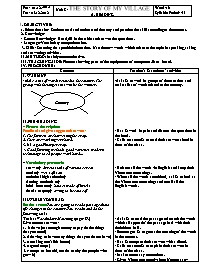Giáo án English 10 - Unit 8: The Story Of My Village - A.Reading - Năm học 2012-2013

I. OBJECTIVES:
1. Education aim: Students read and understand the story and practice the skill according to the context.
2. Knowledge:
- General knowledge: Read, fill in the table and answer the questions.
- Language: Vocabulary comprehension.
3. Skills: Scanning for specific information. Use the new words which relate to the topic in speaking, asking and answering activities.
II. METHOD: Mainly communicative.
III. TEACHING AIDS: Pictures showing parts of the equipments of computers. Extra board.
IV. PROCEDURE:
Bạn đang xem tài liệu "Giáo án English 10 - Unit 8: The Story Of My Village - A.Reading - Năm học 2012-2013", để tải tài liệu gốc về máy bạn click vào nút DOWNLOAD ở trên
Pre : 01.12.2012 Tea: 05.12.2012 Unit 8 : THE STORY OF MY VILLAGE A. READING Week: 16 Syllable Period: 45 I. OBJECTIVES: 1. Education aim: Students read and understand the story and practice the skill according to the context. 2. Knowledge: - General knowledge: Read, fill in the table and answer the questions. - Language: Vocabulary comprehension. 3. Skills: Scanning for specific information. Use the new words which relate to the topic in speaking, asking and answering activities. II. METHOD: Mainly communicative. III. TEACHING AIDS: Pictures showing parts of the equipments of computers. Extra board. IV. PROCEDURE: Contents Teacher’s & students’ activities I. WARM UP - Make a list of words related to the country. The group with the longest list will be the winner. Country II. PRE-READING * Picture description: Feedback and give suggested answers: 1. The farmers are harvesting the crop. 2. They are working very hard. 3. It's a good/bumper crop. 4. Good farming methods, good varieties, modern technology used, people work hard ... * Vocabulary pre-teach: + straw (n): dry cut stalks of various cereals + mud (n): wet, soft soil + technical high school (n): + farming methods (n): + brick houses (n): houses made of bricks + thanks to (prep): owing to, because of III. WHILE YOU READ: Set the scene: You are going to read a passage about life changes in the country. You read it and do the following tasks Task 1: Vocabulary Matching (page: 83) Give correct answers: 1. b (have just enough money to pay for the things that you need) 2. d (having to have many things that you do not have) 3. a (making one's life better) 4. e (good crops) 5. c (crops to be sold, not for use by the people who grow it) Task 2: The reading passage tells us about many changes in the village. Complete the following table. (page 84- Text book) Areas of change Before Now Houses made of straw and mud made of bricks Radio and TV few families had a radio or a TV have a radio or set many families have a radio or tv set Farming methods old new Crops poor good/bumper Travel motorbike Task 3: Answering Questions: (page 84-Text book) 1. It was poor and simple. 2. Because they hope that with an education of science and technology, their children could find a way of bettering their life. 3. They introduced new farming methods which resulted in bumper crops. They also helped grow cash crops for export. 4. He said their lives had changed s lot thanks to the knowledge their children had brought home. 5. He told his grandchildren to study harder so that they can do even more for the village than their parents. IV. POST-READING - How can people with an education help make the life of their community better? * Give suggested answers: + Introduce new farming methods Grow cash crops for export + Help local people apply modern technology in farming + Help community especially young people access to the ways of entertainment + Raise people's awareness about food safety and environmental hygiene. * Homework: -Asks Ss to work in groups of three or four and make a list of words related to the country. - Has Ss work in pairs and discuss the questions in the book. - Calls on some Ss to read their answers aloud in front of the class. - Rub out all the words -in English and keep their Vietnamese meanings. - When all the words are rubbed, ask Ss to look at the Vietnamese meanings and recall all the English words. - Asks Ss to read the passage and match the words which all appear in' the passage in A with their definitions in B. - Encourages Ss to guess the meaning of the words in the context. - Has Ss compare their answers with a friend. - Calls on some Ss to explain their answers in front of the class. - Makes necessary corrections. - Gives Vietnamese equivalents if necessary: - Asks Ss to scan the passage to get specific information to complete the table. - Lets Ss study the table carefully before doing the task. - Goes around the class and provide help. When necessary. - Tells Ss to discuss the answers with a friend. Checks the answers in front of the class as a whole Give correct answers: - Asks Ss to work in pairs: Read the passage again and answer the questions in Task 3 - Tells Ss to underline the information that support the answers. - Has Ss compare their answers with another pair. - Calls on some Ss to read their answers aloud in front of the class. - Ask students to discuss the following question: Asks Ss to work in groups and discuss the question - Clarify some terms like: People with an education refers to people with a university study - Tells Ss to look back to the passage to get the ideas for the questions - Goes to groups and provide help when necessary. - Write a passage about the changes of your home village.
Tài liệu đính kèm:
 A.Reading.doc
A.Reading.doc





